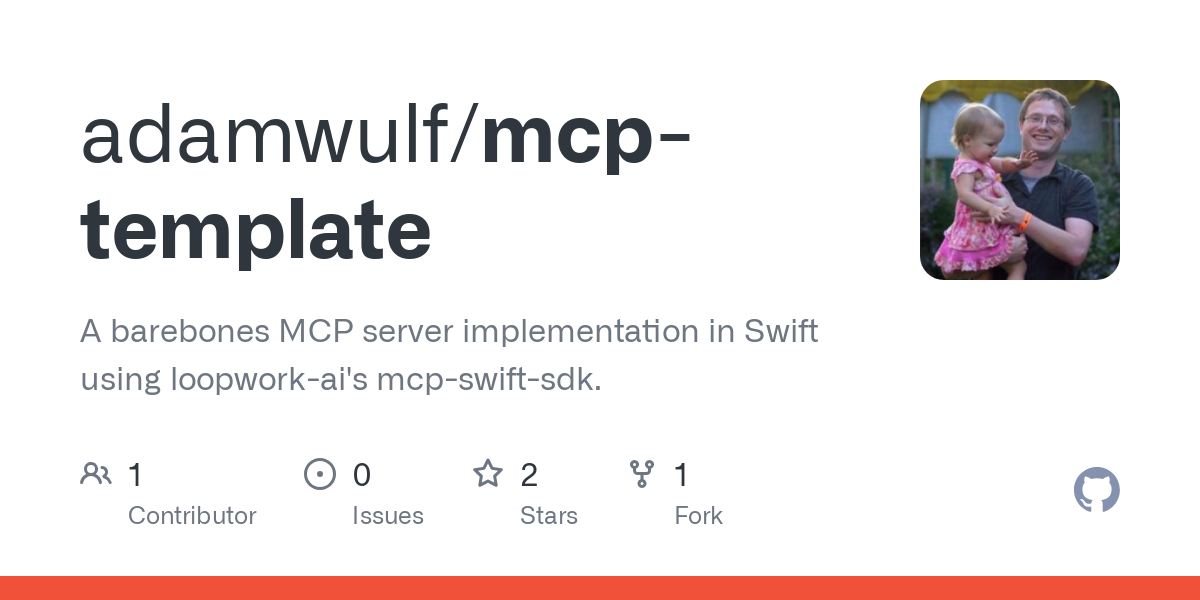adamwulf_mcp_template
by adamwulfSwift MCP Server Template
A template repository providing a barebones foundation for building Model Control Protocol (MCP) servers for macOS applications and command line tools.
Overview
MCP Template serves as a starting point for developers looking to implement MCP servers in their projects. This template demonstrates how to use the mcp-swift-sdk in a minimal way, making it easier to understand the basics of MCP integration. It includes both a library template for integration into other projects and a simple command-line example to illustrate basic usage.
Purpose
This repository is intended to be:
- A reference implementation showing how to use
mcp-swift-sdk - A template that can be forked or cloned as a foundation for your own MCP server implementations
- A barebones example that demonstrates core MCP concepts with minimal code
Features
Current and planned features include:
- [x] Basic Swift package structure
- [x] Command line "hello world" example tool
- [x] Command line stdio for direct MCP interaction via the
runcommand - [ ] App Store safe command line stdio → standalone Mac app communication
- [ ] SSE server in a Package → example command line app for SSE-based MCP
Installation
Swift Package Manager
Add the following to your Package.swift file:
dependencies: [
.package(url: "https://github.com/your-username/mcp-template.git", branch: "main"),
]
Then add the dependency to your target:
.target(
name: "YourTarget",
dependencies: [
.product(name: "EasyMCP", package: "mcp-template")
]
),
Usage
Basic Example
import EasyMCP
// Create an instance of EasyMCP
let mcp = EasyMCP()
// Register a tool
try await mcp.register(tool: Tool(
name: "helloPerson",
description: "Returns a friendly greeting message",
inputSchema: [
"type": "object",
"properties": [
"name": [
"type": "string",
"description": "Name of the person to say hello to",
]
],
"required": ["name"]
]
)) { input in
// It's an async closure, so you can await whatever you need to for long running tasks
await someOtherAsyncStuffIfYouWant()
// Return your result and flag if it is/not an error
return Result(content: [.text(hello(input["name"]?.stringValue ?? "world"))], isError: false)
}
// Start the MCP server for full MCP interaction
try await mcp.start()
try await mcp.waitUntilComplete()
Command Line Example
The package includes a command line executable called mcpexample that demonstrates basic usage:
# Run the basic hello example
mcpexample hello
# Start the MCP server to handle MCP protocol communications
mcpexample run
Project Structure
Targets
- EasyMCP (Library)
- Minimal template implementation of an MCP server
- Demonstrates basic integration with the MCP protocol
- Shows how to leverage the official
mcp-swift-sdk - Includes a simple tool example (helloworld)
- mcpexample (Executable)
- Simple command-line example using the EasyMCP library
- Includes both a hello command and a run command
- The run command starts a full MCP server using stdio transport
- Uses
ArgumentParserfor CLI argument handling - EasyMCPTests (Test Target)
- Template tests for the EasyMCP library functionality
- Includes a basic test for the hello function
Dependencies
- swift-argument-parser (1.3.0+) - Used for CLI argument handling
- mcp-swift-sdk (branch: "feature/wait-for-complete") - Custom fork of the MCP implementation that adds the ability to wait for the mcp server to finish
Development
To use this template for your own MCP server:
- Clone or fork the repository
- Build the package to verify everything works:
shell
swift build
- Run the tests:
shell
swift test
- Modify the EasyMCP implementation to add your custom functionality
- Extend the command line example or create your own Mac application
Testing your MCP command line executable
To test and debug your MCP server using the MCP Inspector:
- Build your command line executable in Xcode
- Locate the executable by going to Xcode → Product → Show Build Folder in Finder
- Copy the absolute path of the executable from that directory
- Use the MCP Inspector to test your server
- Open Terminal and run:
shell
npx @modelcontextprotocol/inspector <absolute_path_to_your_executable> run
- Open your browser to the port shown in the output:
🔍 MCP Inspector is up and running at http://localhost:5173 🚀
- Press the Connect button in the MCP Inspector interface
- Open Activity Monitor and search for your executable name
- Verify only the inspector and a single instance of your tool is running
- In Xcode → Debug → Attach to Process → Find your executable name at the top and attach
- In Terminal, run
tail -n 20 -f ~/Library/Logs/Claude/mcp*.log - Now you can interact with your server through the inspector while hitting breakpoints in Xcode!
This setup provides a powerful debugging environment where you can:
- Test your MCP server's functionality through the Inspector's UI
- Set breakpoints in your code to trace execution
- Inspect variables and state during operation
- Debug resource, prompt, and tool implementations in real-time
For more debugging tips, visit MCP Debugging at Anthropic's modelcontextprotocol.io site.
License
MIT licensed.
Acknowledgments
- loopwork-ai for the MCP Swift SDK
About
A barebones MCP server implementation in Swift using loopwork-ai's mcp-swift-sdk.

